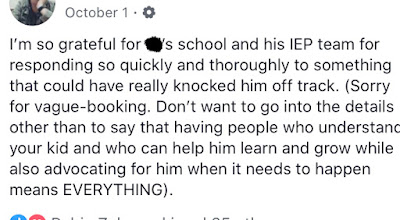"Stow, I got it. Just sit down and shut up."
On the bus ride home from school on the first day of October, Stow heard these ten words from the bus aide. The exchange was observed by another aide, reported to the principal, and responded to immediately. And, in the scheme of things, in a world where so very many bad things can happen to a kid, being told to shut up can seem insignificant. Somehow, though, this became the precipitating event to what has turned out to be another challenging fall.
I was there to meet him when he got off the bus that day because Ren was still very much in the throes of his post-op recovery and couldn't handle Stow on his own. When Stow got off that day, he explained that something bad had happened to a kid and that somebody was going to get into trouble and that it was ok because another grown up had dealt with it. It took three or four tries for me to get enough of the story from Stow to understand that the something had happened to HIM. Once I felt like I had a handle on the story--he was trying to help the bus aide on his special needs bus by telling her what to do and she told him to bug off--I sent an email to his IEP team. It was probably one of the shortest messages I've ever sent an IEP team.
Stow got off the bus upset because he says the bus aide told him to "shut up" and that he was annoying. Obviously, this is highly problematic, and we’d like to get to the bottom of what’s happened and the situation on the bus.
Thanks,
Moe
Almost immediately, I got a call from the principal. He'd heard about the incident from the aide and called me as soon as his afternoon bus duty ended; he hadn't even had time to see my email. Our conversation was short. He assured me that they would act quickly to address the situation. Stow asked to talk to him, and when he did, the principal told Stow how sorry he was that someone had treated him like that and promised that everything would be ok.
I hoped and believed that it would, but fall has always been hard for the boys, and everyone who works with Stow knows how fragile his successes can be and how quickly he can spiral.
I hoped and believed that it would, but fall has always been hard for the boys, and everyone who works with Stow knows how fragile his successes can be and how quickly he can spiral.
 |
| Day 1 |
The next morning, the aide was still on the bus. Sometimes things don't happen as quickly as we'd like. It took the bus company some time to find and review the video of the incident and then a little longer for them to find a replacement aide for Stow's bus. It broke my heart to see him get on the bus that next morning and to see the offending aide not even greet him.
I tried asking him if it worried him to have the aide on his bus, and more than once, he said it didn't. I am sure that it's true that he didn't think it bothered him. But, what is also true, is that starting on October 2nd and for weeks now since, he has struggled behaviorally at school. Before the bus incident, he had day after day of truly positive behavior charts. In fact, not long before the incident, we'd met with his IEP to discuss scaling back some of his supports because he was doing so well.
Stow rides the "short bus" because he finds it hard to manage the social aspects of the "long bus." On the long bus, kids get into conflicts and the driver yells. A kid like Stow can make terrible choices in that kind of setting, and the drivers aren't usually equipped to support a kid who struggles. Ironically, the very thing we were trying to avoid by having him ride the special needs bus not only happened but also triggered every anxiety he has about getting into trouble for trying to help. He can't articulate any of this; in fact, things like this remind us of how much of what he experiences/feels sits just outside of his ability to comprehend.
It seems unfathomable that something as little as this moment of impatience and a failure to self-censor could derail a kid so, but Stow's teacher and I both keep track of his behavior (because behavior MEANS things; it ALWAYS means things), and it has steadily worsened starting with the bus incident. At this point, we find ourselves in unchartered territory given the struggles he is having at school, and though his team knows Stow well, they can't figure out how to get him back on track.
This is autism, you guys. You figure out what works, and for awhile it works. Sometimes it works so well that you feel like you've unlocked finally cleared a level in the video game called Life With Autism. And, then suddenly, the littlest thing can send you right back to the beginning. For those of you out there dealing with these kinds of challenges or worse, hang in there! We’re with you!!







